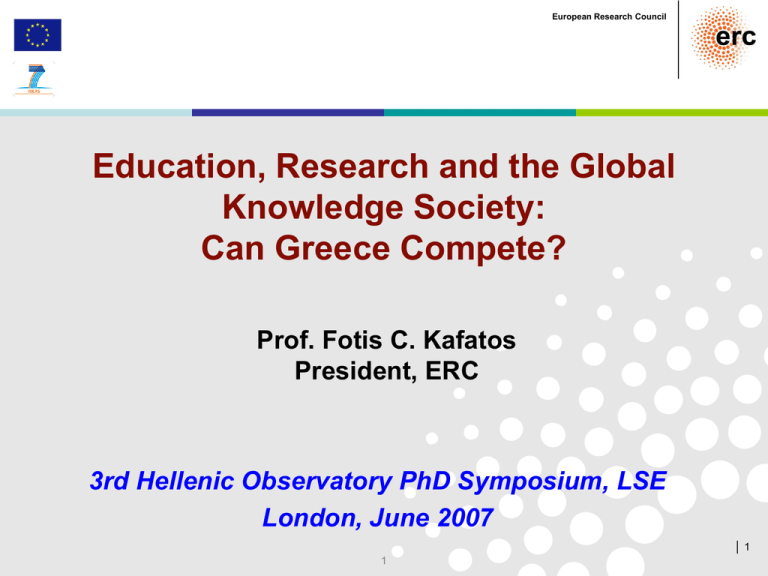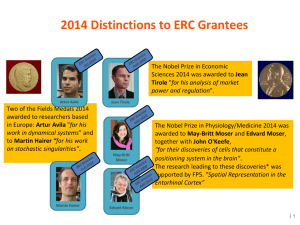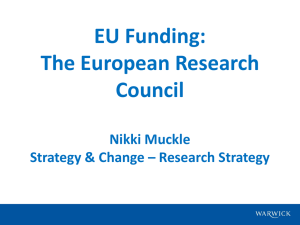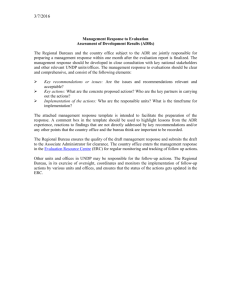Education, Research and the Global Knowledge Society: Can Greece Compete?
advertisement

European Research Council Education, Research and the Global Knowledge Society: Can Greece Compete? Prof. Fotis C. Kafatos President, ERC 3rd Hellenic Observatory PhD Symposium, LSE London, June 2007 │1 1 European Research Council The ERC: Competion for Excellence at a Pan-European Level • A major European initiative to support frontiers research • A logical development of the European Research Area • Securely anchored in EU legislation but at the same time….. A revolutionary development │2 2 European Research Council Does Europe Need Frontiers Research? • Yes, an essential part of our civilization Galileo, Newton, Darwin, Freud Einstein, Watson & Crick, Jacob & Monod… and? • What will be our future competitive advantage? Ageing and shrinking population? High Labour and Social Security costs? Expensive production and services? Limited natural resources? Capital accumulation and management? │3 3 European Research Council Europe Can Only Compete Through Knowledge • Leadership in Science, the Endless frontier • Central Role in the Knowledge Triangle: Education / Research / Innovation • Investment in excellent research is an imperative, not an option │4 4 European Research Council To Become More Competitive, Europe Must • Generate, Attract and Retain Top Talent • Integrate and Internationalize our Efforts • Encourage and Trust the Young • Create Attractive Career Path • Competitive Champions League, set standards by merit only (as in football) │5 5 European Research Council Birth and Structure of the ERC • Proposals of the Commission to establish ERC through Framework Programme 7 • Political Context: P. Busquin & ERA; J. M. Gago & Lisbon A. Mitsos & Added Value Argument: Competition for Excellence at European Level • Adoption FP7 (18/12/06) & Specific Programme “Ideas” (19/12/06); EC decision establishing ERC (02/02/07); 7.51b€ for 2007-2013 • ERC consists of an independent Scientific Council supported by a Dedicated Implementation Structure / Executive Agency • EC acts as guarantor of ScC autonomy and integrity and ensures proper functioning of the ERC • Commissioner Potočnik nominated ScC (18/07/06) by arms-length independent procedure (Patten Identification Committee) │6 6 European Research Council ERC Scientific Council: Aim, Responsibilities and Actions • Collaborates with EC towards an autonomous, integrated world-class Research Funding Agency • Defined ERC Strategy & Annual Work Programme • Decided Calls for Proposals • Established Evaluation Rules & Procedures • Selected Evaluation Panels • Intensive 1 yr work before establishment │7 7 European Research Council The ERC Strategy, 1 • Address essentials, obvious gaps in Europe - Opportunities and independence for young scientists - Individual frontier research programs - Significant funding to make a difference • Trust the dynamic of science - Interdisciplinarity is encouraged - Excellence attracts excellence - The effects of critical mass - From individual to institutional excellence │8 8 European Research Council The ERC Strategy, 2 • Keep it simple - All fields of science and scholarship are eligible - Excellence is the sole criterion - Research results are the only deliverable - Referees & Evaluation Panels selected by excellence - Flat 20% contribution to overheads • Keep it flexible - Evaluation panels judge investment levels - Researchers can rebudget - Grants are portable │9 9 European Research Council See http://erc.europa.eu │ 10 10 European Research Council ERC Starting Independent Researcher Grant (ERC Starting Grant) -Ca. 300 M€; 200 grants, average 1.5M€ for 5 years - i.e. 200 new investigators per call, ca. 1400 in 7 years Sole selection criterion: Excellence of person & proposal - Eligibility: - ≤ 9 years since Doctorate + 3 years for service - Recently established or offered a position - To work within EU or Associated States - No nationality criterion 3 Rs: Recruit, Repatriate, Retain TOP TALENT │ 11 11 European Research Council ERC Advanced Investigator Grant (ERC Advanced Grant) -Annual budget minus ERC Starting Grants - From ca. 600 M€ to over 1 billion € / year - ca. 200/500 grants awarded each year - Sole selection criterion: Excellence of proposal & track record - Eligibility: (a) investigators at all career stages (b) located or moving to Europe (c) no age limit or nationality criterion Recruit, Repatriate, Retain │ 12 12 European Research Council Calls for applications - Starting Grants First call: December 2006 Submission deadline: 25 April 2007 - Advanced Grants First call: early 2008 - Starting and Advanced Grants One call per year, from 2008 │ 13 13 European Research Council Starting Grants: Foster Early Independence of Young Investigators Principal Investigators (PI’s): Outstanding young scientists European and non-European Working or moving to Europe Host institutions: - Universities - Research Organizations (including companies, if they allow independent research) Based in a European Member State or Associated Country │ 14 14 European Research Council ERC Starting Grants: Guarantees of Scientific Independence Principal Investigators must be able to: • choose their co-workers • decide on the evolving directions of their work • re-allocate resources as necessary • publish their scientific results without restrictions and independently (with, as coauthors, only those who contribute to the work significantly) │ 15 15 European Research Council ERC Grants: Salary Issues Host institutions have to maximize available administrative and legal options to provide for a competitive salary for nationals and non-nationals • Host institution engages the PI, pays salary • Part (or all) of PI’s salary can be charged the ERC Grant (joint funding?) • Additional personnel costs related to research can be covered by the ERC Grant │ 16 16 European Research Council ERC Grants: Portability ERC Grants are portable: • “Money follows the researcher” • The PI is entitled to transfer the grant to another institution after a minimum 2 years at the sponsoring institution • Proper justification and ERC approval required │ 17 17 European Research Council ERC Starting Grants: Scientific Domains • Social Sciences and Humanities (SH) • Mathematics, physical sciences, information and communication, engineering, universe and earth sciences (PE) • Life Sciences (LS) Budget allocation SH 15% PE 45% LS 40% │ 18 18 European Research Council Starting Grants First Call: Proposals received by domain Domain Number of proposals % Life Sciences 3,396 37.0 Physical Sciences & Engineering 4,408 48.1 Social Sciences & Humanities 1,363 14.9 Total 9,167 100 │ 19 19 Starting Grants First Call: European Research Council % Geographic Distribution: European and Overseas Clusters Cluster PI residence Host Institution location EEC6: BE, DE, FR, IT, LU, NL 44.8 46.2 Next 9 of EU15: AT, DK, EL, ES, FI, IE, PT, SE, UK 35.5 37.2 Next 12 of EU 27: BG, CY, CZ, EE, HU, LT, LV, MT, PL, RO, SI, SK 8.6 8.8 7 EU-associated or candidate: CH, HR, IL, IS, NO, RS, TR 7.9 7.8 6 Overseas highly developed: AU, CA, JP, NZ, TW, USA 2.8 0 AL, AR, BR, BF, CN, EG, IN, IR, KH, ME, MX, SN, TN, RU, SG, UA, UZ, ZA, ZW 0.4 0 100 100 20 │ 20 European Research Council Starting Grants First Call: “Gain-loss” figures Country To Institution From Residence Italy + 44 * Greece + 36 France + 34 Spain + 32 Germany + 26 Sweden + 23 Austria + 17 U.K. + 15 Netherlands + 14 Finland + 11 Switzerland - 17 Romania -8 Belgium 21 -4 │ 21 European Research Council Can Greece Compete? • Rich human resources • A few good universities of high level research institutions But • Structural limitations • Universities: • “One type fits all” • Inflexible legal and political framework • Under-funded • Dispersed faculties • Locked into an unreformed system • Research: • Under-funded (<0.6% of national income and declining) • Lack of a national programme for bottom-up research 22 │ 22


